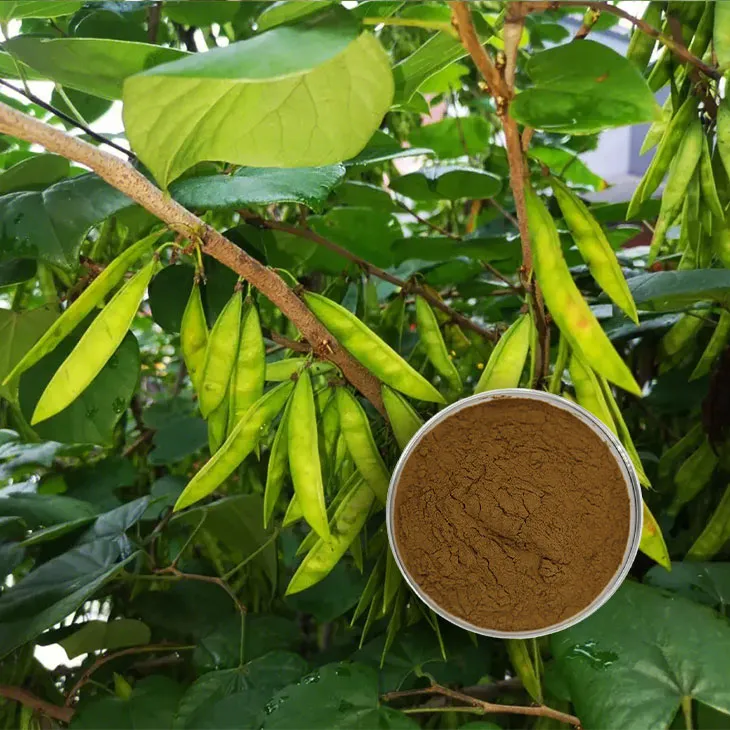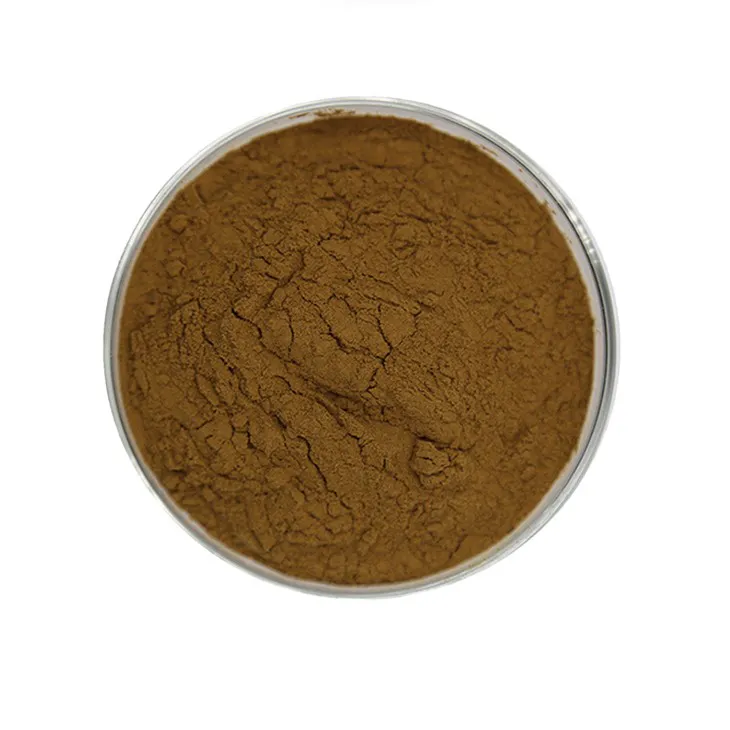- 0086-571-85302990
- sales@greenskybio.com
Saponin Extract: Benefits, Uses and Possible Side Effects
2024-11-12

1. Introduction to Saponin Extracts
Saponin Extracts have been attracting increasing attention in multiple fields in recent years. Saponins are a diverse group of natural compounds that are widely distributed in the plant kingdom. They can be found in a variety of plants, including but not limited to legumes, certain herbs, and some tree species.
The chemical structure of saponins is characterized by a glycoside part attached to a triterpene or steroid aglycone. This unique structure endows saponins with a wide range of biological activities, which are of great significance in different applications.

2. Benefits of Saponin Extracts
2.1 Antioxidant Properties
One of the most prominent benefits of saponin extracts is their antioxidant properties. In the human body, oxidative stress occurs due to an imbalance between the production of reactive oxygen species (ROS) and the body's antioxidant defense mechanisms. ROS can cause damage to cells, proteins, and DNA, which is associated with various diseases and the aging process.
Saponins act as antioxidants by scavenging free radicals, which are highly reactive molecules that contribute to oxidative stress. By neutralizing these free radicals, saponin extracts help protect the body's cells from oxidative damage. This antioxidant activity has been studied in vitro and in vivo, and has shown potential in preventing chronic diseases such as cardiovascular diseases, cancer, and neurodegenerative disorders.
2.2 Anti - inflammatory Effects
Saponin extracts also exhibit anti - inflammatory effects. Inflammation is a normal physiological response of the body to injury or infection. However, chronic inflammation can lead to tissue damage and is involved in the pathogenesis of many diseases, such as arthritis, diabetes, and inflammatory bowel disease.
Studies have shown that saponins can modulate the immune system and reduce the production of inflammatory mediators, such as cytokines and prostaglandins. By suppressing inflammation, saponin extracts may help alleviate the symptoms of inflammatory diseases and promote tissue repair.
2.3 Hypolipidemic and Hypoglycemic Effects
Another important benefit of saponin extracts is their potential in regulating lipid and glucose metabolism. Some saponins have been shown to lower blood lipid levels, including cholesterol and triglycerides. This hypolipidemic effect may be due to their ability to interfere with lipid absorption in the intestine, promote lipid metabolism in the liver, or both.
In addition, saponin extracts may also have hypoglycemic effects. They can improve insulin sensitivity, stimulate insulin secretion, or regulate glucose uptake in cells. These effects make saponin extracts potentially useful in the prevention and treatment of hyperlipidemia and diabetes.

3. Uses of Saponin Extracts
3.1 Cosmetic Industry
In the cosmetic industry, saponin extracts are highly valued for their skin - enhancing effects. One of the main applications is in improving skin hydration. Saponins can form a thin film on the skin surface, which helps to retain moisture and prevent water loss from the skin. This results in a more hydrated and supple skin appearance.
Moreover, saponin extracts are also used for reducing wrinkles. They can stimulate collagen synthesis in the skin, which is an important protein that provides structural support to the skin. By increasing collagen production, saponin extracts can help to reduce the appearance of wrinkles and fine lines, making the skin look younger and more elastic.
Some saponin - containing plants are also used in natural cosmetics for their anti - inflammatory and antioxidant properties. These properties can protect the skin from environmental damage, such as UV radiation and pollution, and prevent skin aging.
3.2 Traditional Medicine
Saponin - containing plants have a long history of use in traditional medicine. For centuries, different cultures around the world have used these plants to treat various ailments.
In Chinese traditional medicine, for example, some herbs rich in saponins are used to tonify the body, improve digestion, and relieve pain. In Ayurvedic medicine, saponin - containing plants are used for treating skin diseases, respiratory problems, and joint disorders.
Although the exact mechanisms of action in traditional medicine are not always fully understood, modern research has begun to uncover the pharmacological properties of saponins that may support their traditional uses. For instance, the anti - inflammatory and antioxidant effects of saponins may contribute to their effectiveness in treating inflammatory and oxidative stress - related diseases.
3.3 Food and Beverage Industry
The food and beverage industry is also exploring the use of saponin extracts. Saponins can be used as natural food additives, for example, as emulsifiers or foaming agents. Their ability to form stable emulsions and foams can improve the texture and appearance of food products.
In addition, some saponins have been shown to have bioactive properties in food. For example, they may have anti - microbial effects, which can help to preserve food and extend its shelf - life. However, the use of saponin extracts in food and beverage products needs to comply with safety regulations to ensure consumer health.

4. Possible Side Effects of Saponin Extracts
While saponin extracts offer numerous benefits, it is important to be aware of their possible side effects. One of the most common side effects associated with high doses of saponin extracts is gastrointestinal discomfort.
When consumed in excessive amounts, saponins can irritate the lining of the stomach and intestines, leading to symptoms such as nausea and vomiting. In some cases, they may also cause diarrhea or abdominal pain.
Another potential side effect is related to the interference of saponins with nutrient absorption. Saponins can form complexes with certain nutrients, such as proteins and minerals, which may reduce their bioavailability. This could potentially lead to nutrient deficiencies if saponin intake is very high over a long period of time.
It should be noted that the occurrence and severity of side effects may vary depending on factors such as the type of saponin, the dose, the duration of use, and individual susceptibility. Therefore, it is advisable to use saponin extracts under the guidance of a healthcare professional, especially when using them for medicinal purposes.

5. Conclusion
In conclusion, saponin extracts are a group of natural compounds with a wide range of benefits and uses. Their antioxidant, anti - inflammatory, hypolipidemic, and hypoglycemic properties make them potentially valuable in various fields, including cosmetics, traditional medicine, and the food and beverage industry.
However, the possible side effects of saponin extracts should not be overlooked. Further research is needed to fully understand the safety and efficacy of saponin extracts, especially in terms of long - term use and high - dose applications. Overall, for those interested in natural products and their applications, a comprehensive understanding of saponin extracts is crucial to ensure their safe and effective use.
FAQ:
What are saponin extracts?
Saponin extracts are substances that come from saponins, which are natural compounds found in many plants.
What are the main benefits of saponin extracts?
The main benefits of saponin extracts include having antioxidant properties. These antioxidant properties are useful in fighting oxidative stress within the body.
How are saponin extracts used in the cosmetic industry?
In the cosmetic industry, saponin extracts are used for their skin - enhancing effects. For example, they can improve skin hydration and help in reducing wrinkles.
What is the role of saponin - containing plants in traditional medicine?
In traditional medicine, saponin - containing plants have been used for centuries to treat a variety of ailments.
What are the possible side effects of saponin extracts?
The possible side effects of saponin extracts include gastrointestinal discomfort such as nausea and vomiting, especially when taken in high doses.
Related literature
- The Chemical and Biological Properties of Saponins"
- "Saponin Extracts: A Comprehensive Review of Their Applications"
- "Beneficial and Adverse Effects of Saponins: An Overview"
- ▶ Hesperidin
- ▶ Citrus Bioflavonoids
- ▶ Plant Extract
- ▶ lycopene
- ▶ Diosmin
- ▶ Grape seed extract
- ▶ Sea buckthorn Juice Powder
- ▶ Fruit Juice Powder
- ▶ Hops Extract
- ▶ Artichoke Extract
- ▶ Mushroom extract
- ▶ Astaxanthin
- ▶ Green Tea Extract
- ▶ Curcumin
- ▶ Horse Chestnut Extract
- ▶ Other Product
- ▶ Boswellia Serrata Extract
- ▶ Resveratrol
- ▶ Marigold Extract
- ▶ Grape Leaf Extract
- ▶ New Product
- ▶ Aminolevulinic acid
- ▶ Cranberry Extract
- ▶ Red Yeast Rice
- ▶ Red Wine Extract
-
Yohimbine Bark Extract
2024-11-12
-
Reishi mushroom extract
2024-11-12
-
Hedyotis Diffusa Extract
2024-11-12
-
Astaxanthin
2024-11-12
-
Thunder God Vine Extract
2024-11-12
-
Carrageenan Extract Powder
2024-11-12
-
Tinospora cordifolia extract
2024-11-12
-
Clove Powder
2024-11-12
-
White Peony Extract
2024-11-12
-
Grape Seed Extract
2024-11-12





















